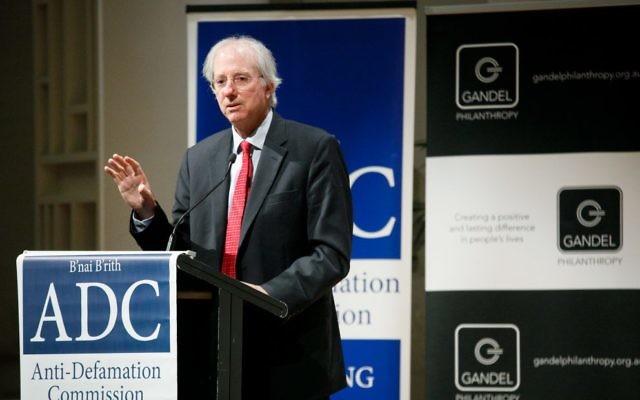Israel: the good and the bad news
DELIVERING the 35th B’nai B’rith Anti-Defamation Commission Gandel Oration to a capacity audience at Moriah College, acclaimed US diplomat Dennis Ross divided his address between “good news, bad news and uncertain news”.
DELIVERING the 35th B’nai B’rith Anti-Defamation Commission Gandel Oration to a capacity audience at Moriah College, acclaimed US diplomat Dennis Ross divided his address between “good news, bad news and uncertain news”.
The seasoned negotiator, who served under presidents Ronald Reagan, George H.W. Bush, Bill Clinton and Barack Obama and most recently as special adviser to former secretary of state Hillary Clinton on the Persian Gulf and southwest Asia, began his July 11 oration, ‘Doomed to Succeed’, with the upsides.
To Israelis, President Donald Trump sounds more favourably disposed than Obama. “Tone matters”, said Ross. And with Europe always more critical of Israel than the US, Obama set a low bar for the Europeans.
America’s UN ambassador Nikki Haley has made exposing the UN Human Rights Council’s relentless focus on Israel “a persistent theme”. In an age when UNESCO has passed a resolution denying Jerusalem’s holy sites are part of Israel, “the essence of anti-Semitism”, Haley’s work is valuable, he said.
Ross reported Israel’s relations with its Sunni Arab neighbours are strengthening against an ascendant Iran. Israel is seen by Sunnis as a reliable force in the neighbourhood, even if ties are “below the radar screen because of the Palestinian issue”.
Israel is viewed as a key energy exporter – it has a natural-gas deal with Jordan and soon there will be one with Turkey – while India, former beacon of the unaligned bloc, with its large Muslim community, is now a friend, particularly after the visit of PM Narendra Modi. Israeli outreach to Africa is at a high, and China invests heavily in Israeli high-tech.
But then Ross unloaded “the bad news”: Israel’s relations with Russia are “narrow” and Moscow, like Beijing, supported UN resolution 2334, which demands Israel pull back to the 1967 lines, a position Ross had earlier helped modify so there could be land swaps for negotiated boundaries, he said.
Russia has “abetted Iranian power”, with Iran planning to push Shia militias along a land corridor into Syria and Lebanon, and south to Jordan and Israel, with Hezbollah only three kilometres from the Golan Heights.
Europe is a further source of bad news, he said, with polarisation to the left and right. On the left, UK opposition leader Jeremy Corbyn views Hezbollah and Hamas “as legitimate political actors”, and many British academics and unions support BDS, while “the far right has always been associated with anti-Semitism”.
Delivering “the uncertain news”, Ross turned to the imponderables about Trump. “For 70 years, the United States has been the main guarantor of a liberal international order … important for all of us, for Israel, for Jewish communities”.
While Secretary of State Rex Tillerson and Defence Secretary James Mattis “remain committed”, Trump wants to look inward, and that could mar prospects for an Israeli–Palestinian peace. Trump has called such a peace “the ultimate deal”, said Ross. “We don’t know if he’s going to sustain the interest when he finds out the ultimate deal isn’t possible any time soon. Will he wash his hands and walk away?”
PETER KOHN


comments